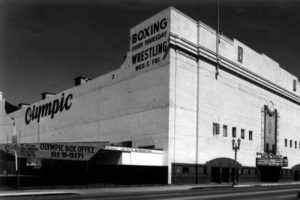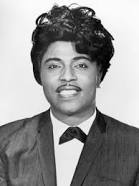Little Richard: ‘awopbopaloobop alopbamboom’
Posted on May 9, 2020
Filed Under Culture, Music | Leave a Comment
On the evening of May 8, 1970, I was covering a rock concert at The Grand Olympic Auditorium at 18th and Grand in Downtown Los Angeles. For years the Olympic had been home to boxing, wrestling and Roller Derby (the Los Angeles T-Birds) but from 1969 to 1970 the auditorium shared it sports events with rock concerts. Groups included Mountain, Jack Bruce, Ten Years After, Frank Zappa and the Mothers, Quicksilver Messenger Service and, on this night Little Richard. Little Richard was on his comeback trail after years of religion and gospel, and after being overshadowed by the British Invasion and American rockers who appropriated his music for their success. But on stage, Little Richard gave unequaled dynamic shows (rivalled only by James Brown).
The Olympic was a disputed cultural arena in Los Angeles at this time. Hard-core conservative fans of wrestling and boxing resented having to share their “home” with dirty, “unwashed hippies,” and the LAPD, under the stewardship of Chief Ed Davis, was well-known for its racial and cultural profiling (i.e., blacks and long-hairs). Rock events were well-attended by the LAPD, who patrolled outside and inside the building. During Little Richard’s outrageous concert I was wandering around in the audience, covering it for my college newspaper, taking notes, noticing the cops hassling — and arresting — people. At one point I was in the bathroom and overhead two cops laughing about a bust they had just made — “did you see his face when I smashed his head into the urinal” one commented.
As the evening wore on, Little Richard’s on-stage theatrics and loud music grew wilder and wilder. The audience was whipped into a rock ‘n’ roll frenzy, and Little Richard began inviting the crowd up on the stage. Only the stage — basically the ring at the Olympic — couldn’t handle the weight. In a 1990 interview with Rolling Stone Little Richard tells the rest. “Collapsed. The piano fell. The stage fell. One guy broke his leg. It was pandemonium: The crowd was screaming, and they kept screaming. I was on top of the piano, and I was screamin’ too, ’cause I was fallin’. Everybody was screamin’. Screamin’ and screamin’!”
That was all the LAPD needed. In short order scores of cops showed up, closed down the concert, and chased everyone away. Rock concerts at the Olympic pretty much died out after that. (But, in 1980, the Grand Olympic once again became a musical venue. Public Image Ltd. kicked off a half-decade of punk rock music performances that brought the auditorium a reputation for being a notorious Punk Rock venue. In June 2005, the Glory Church of Jesus Christ, a Korean-American Christian church purchased the entire property, and the Grand Olympic Auditorium ceased to exist).
Little Richard died May 9. He was 87. Richard, whose real name was Richard Penniman, was born in Macon, Georgia in December 1932. He had been in poor health for several years, suffering hip problems, a stroke and a heart attack. Richard’s agent, Dick Alen, said: “Little Richard passed away this morning from bone cancer in Nashville.
His 1955 song Tutti Frutti, with the lyric “awopbopaloobop alopbamboom,” and a series of follow-up records helped establish the rock “n” roll genre and influenced a multitude of other musicians. Richard’s career began when in the late 1940s but his early recordings with RCA Victor garnered little success. His breakthrough came when he signed to Specialty Records in 1955, releasing a run of wild and flamboyant singles – Tutti Frutti, Long Tall Sally, Rip It Up, The Girl Can’t Help It, Lucille, Keep A-Knockin’ and Good Golly, Miss Molly, among others – that made him a star on both sides of the Atlantic.
Comments
Leave a Reply

